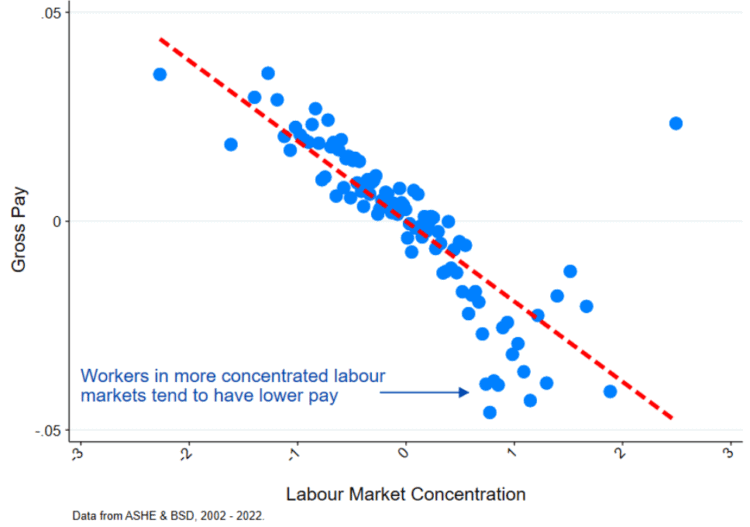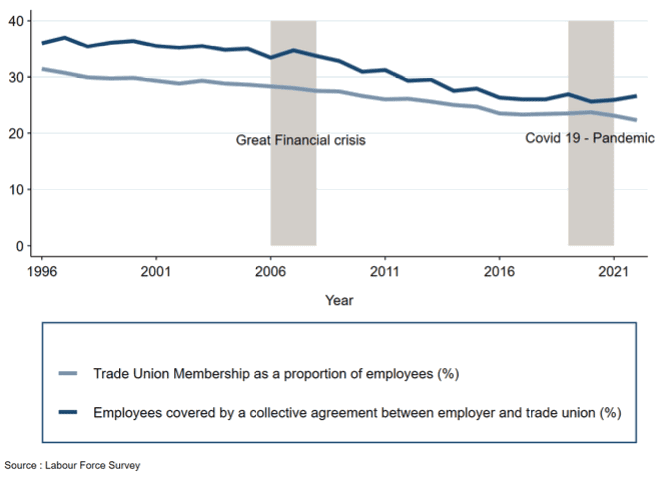Collective bargaining can redress the vulnerability of workers who find themselves in a buyers’ labour market.

Imagine a man looking for a job but there are only four viable employers for his profile. He will have a hard time negotiating good pay because his alternatives—and thereby his bargaining power—are limited. Now imagine that his sister, by contrast, has 50 employers from which to choose. As she has more leverage with her prospective employer, she will most likely be paid a higher wage.
The story of these siblings is the story of the wider labour market, according to a recent report by the Competition and Markets Authority in the United Kingdom, where a significant number of workers are in the situation of the brother. They are looking for jobs in relatively concentrated labour markets, where there are few employers from which to select.
This concentration gives companies considerable wage-setting power, enabling employers to impose terms and conditions. As a result, workers face wage discounts of up to 10 per cent compared with their counterparts in more competitive sectors. A chart from the report illustrates this well: the greater the concentration of the labour market, the lower the wages paid to workers.

Furthermore, this power imbalance translates into fewer working hours for workers, as companies seek to optimise their labour costs by cutting hours. It is a stark reminder that wages are not simply determined by skill or effort but are deeply rooted in power dynamics within the workplace.
Record vacancies
As we wrote elsewhere, we see the same developments in the European Union. The demand for labour is high, with a record number of vacancies for every job-seeker. We would expect wages to rise but this is not happening. Instead, as a report from the Organisation for Economic Co-operation and Development found, labour markets in many countries are malfunctioning due to excessive corporate power: 16 per cent of workers with specific skills have a limited choice among employers. Some occupations are more affected than others: roughly half of printing workers and health professionals have little to no choice at all.
Fortunately, the recent UK report presents a solution—collective bargaining. The main way to restore this imbalance is to pool workers’ power. By joining forces and bargaining collectively, workers can strengthen their position and mitigate the adverse effects of labour-market concentration. The report highlights that in sectors where collective bargaining is prevalent the wage markdown for concentrated labour markets disappears, signalling the transformative potential of collective action:
In summary, we find that wages are negatively related to labour market concentration, even after accounting for the characteristics of each worker and the firm they work for. This negative relationship disappears for workers covered by collective bargaining agreements, and generally weakened over the past twenty years.
Despite its obvious benefits, however, collective bargaining in the UK (and many EU countries) has been losing ground over the years. As another chart from the report shows, there has been a steady decline in coverage by collective agreements (blue) and trade-union density (grey), leaving workers increasingly vulnerable to the whims of employers.

The declining prevalence of collective bargaining underlines the urgent need to strengthen and revitalise this essential mechanism for equitable wage determination. It not only serves to redress the power imbalances inherent in concentrated labour markets but also promotes a fairer and more inclusive economy for all.
Call to action
The UK report serves as a call to action: policy-makers, employers and workers alike should recommit to the principles of collective bargaining and empower workers to assert their rights in the face of entrenched corporate dominance. Only through a concerted effort to rebalance the power dynamics can we strive for a future where wages are just and reflect the true value of labour.
Fortunately, within the European Union, policy-makers and social partners are not just encouraged but legally obliged to reinforce collective bargaining. The 2022 directive on adequate minimum wages is very clear on that and countries with collective-bargaining coverage below 80 per cent must devise precise, tailored national action plans to address the shortfall. This presents member states with a distinct opportunity to take back the narrative, improve the working conditions of their citizens and pave the way for a fairer and more prosperous future.


